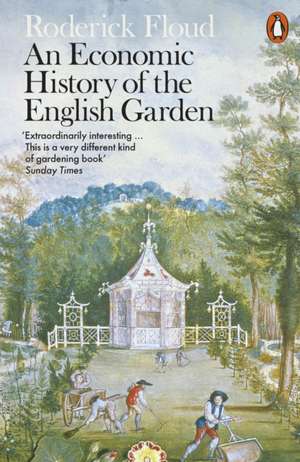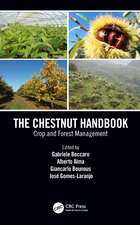An Economic History of the English Garden
Autor Roderick Flouden Limba Engleză Paperback – 4 noi 2020
'Thousands of books have been written about the history of British gardens but Roderick Floud, one of Britain's most distinguished economic historians, asks new and important questions: how much did gardens cost to build and maintain, and where did the money come from? Superbly researched, it is full of information which will surprise both economists and gardeners. The book is fun as well as edifying: Floud shows us gardens grand and humble, and introduces us gardeners, plantsmen and technologies in wonderful varieties.' Jane Humphries, Centennial Professor, London School of Economics
At least since the seventeenth century, most of the English population have been unable to stop making, improving and dreaming of gardens. Yet in all the thousands of books about them, this is the first to address seriously the question of how much gardens and gardening have cost, and to work out the place of gardens in the economic, as well as the horticultural, life of the nation. It is a new kind of gardening history.
Beginning with the Restoration of Charles II in 1660, Roderick Floud describes the role of the monarchy and central and local government in creating gardens, as well as that of the (generally aristocratic or plutocratic) builders of the great gardens of Stuart, Georgian and Victorian England. He considers the designers of these gardens as both artists and businessmen - often earning enormous sums by modern standards, matched by the nurserymen and plant collectors who supplied their plants. He uncovers the lives and rewards of working gardeners, the domestic gardens that came with the growth of suburbs and the impact of gardening on technical developments from man-made lakes to central heating.
AN ECONOMIC HISTORY OF THE ENGLISH GARDEN shows the extraordinary commitment of money as well as time that the English have made to gardens and gardening over three and a half centuries. It reveals the connections of our gardens to the re-establishment of the English monarchy, the national debt, transport during the Industrial Revolution, the new industries of steam, glass and iron, and the built environment that is now all around us. It is a fresh perspective on the history of England and will open the eyes of gardeners - and garden visitors - to an unexpected dimension of what they do.
Preț: 70.38 lei
Preț vechi: 95.40 lei
-26% Nou
Puncte Express: 106
Preț estimativ în valută:
13.47€ • 14.67$ • 11.35£
13.47€ • 14.67$ • 11.35£
Carte disponibilă
Livrare economică 04-15 aprilie
Livrare express 18-22 martie pentru 49.10 lei
Preluare comenzi: 021 569.72.76
Specificații
ISBN-13: 9780141981703
ISBN-10: 0141981709
Pagini: 416
Dimensiuni: 129 x 198 x 24 mm
Greutate: 0.34 kg
Editura: Penguin Books
Colecția Penguin
Locul publicării:London, United Kingdom
ISBN-10: 0141981709
Pagini: 416
Dimensiuni: 129 x 198 x 24 mm
Greutate: 0.34 kg
Editura: Penguin Books
Colecția Penguin
Locul publicării:London, United Kingdom
Notă biografică
Roderick
Floudhas
been
a
pioneer
of
two
new
kinds
of
history:
using
statistics
to
study
the
past
and
the
history
of
human
height
and
health.
The
economic
history
of
gardens
is
his
third
innovation.
He
has
taught
at
the
universities
of
Cambridge,
London
and
Stanford,
has
written
or
edited
over
70
books
and
articles
and
is
the
long-standing
editor
of
theCambridge
Economic
History
of
Modern
Britain.He
has
also
led
London
Metropolitan
University
and
Gresham
College
London
and
undertaken
many
other
roles
in
the
university
world,
such
as
President
of
Universities
UK,
receiving
a
knighthood
for
services
to
higher
education.
Recenzii
A
fascinating
history
of
gardening
reveals
our
expensive
passion
for
all
things
green...
This
is
the
first
economic
history
of
the
English
garden
and
frankly
it's
almost
shocking
that
no
one
has
looked
into
it
until
now...
There
is
a
mind-boggling
amount
of
detail
in
this
book
...
Floud
is
a
clear
writer
and
excels
at
providing
context
and
keeping
the
whole
enterprise
grounded.
We have social histories of the English garden, art histories of the big ones and plant histories of what went where. We seldom have a financial history.Floud has set out to write one, applying his head for statistics to this under-cultivated field...an invaluable checklist... Floud's bigger point is that gardening is and has been a big element of the total economy. ...Amazing. Floud casts his net wide.
This is a very different kind of gardening book.It's not about design or horticultural techniques, but is a history, -the first of its kind, the author claims - of the economics of gardening, financial excess and all, from Charles II to today ... extraordinarily interesting. Floud impresses on us the sheer scale of what we're dealing with here...his book is full of fascinating detail- about everything from working-class gardens, kitchen gardens and nurseries, to the astonishing cost of some rare plants and their shrinking value over time.
This is one of the most important books on garden history in the last half century and, for anyone serious about the subject, it is a Must Buy.
a new kind of garden history ... Filled withfascinatingand oftensurprisingdetails
this is animmensely engagingbook. The figures Floud presents,while abundant and obviously carefully uncovered, are so remarkable... Floud's economic approach may seem an oblique means of interpreting [a landscape] but, trust me, it issurprisingly rewarding
We have social histories of the English garden, art histories of the big ones and plant histories of what went where. We seldom have a financial history.Floud has set out to write one, applying his head for statistics to this under-cultivated field...an invaluable checklist... Floud's bigger point is that gardening is and has been a big element of the total economy. ...Amazing. Floud casts his net wide.
This is a very different kind of gardening book.It's not about design or horticultural techniques, but is a history, -the first of its kind, the author claims - of the economics of gardening, financial excess and all, from Charles II to today ... extraordinarily interesting. Floud impresses on us the sheer scale of what we're dealing with here...his book is full of fascinating detail- about everything from working-class gardens, kitchen gardens and nurseries, to the astonishing cost of some rare plants and their shrinking value over time.
This is one of the most important books on garden history in the last half century and, for anyone serious about the subject, it is a Must Buy.
a new kind of garden history ... Filled withfascinatingand oftensurprisingdetails
this is animmensely engagingbook. The figures Floud presents,while abundant and obviously carefully uncovered, are so remarkable... Floud's economic approach may seem an oblique means of interpreting [a landscape] but, trust me, it issurprisingly rewarding






















